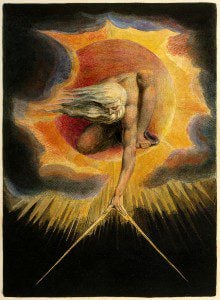The Ancient of Days (William Blake, 1794) [public domain / Wikimedia Commons]
When God creates, what He creates is already less perfect than He is, just by the fact that it is created, whereas He is eternal and uncreated. So, for example, human beings are not omniscient, or omnipotent, or omnipresent, as God is. They’re not absolutely perfect, and indeed cannot be, since there is only one God, Who is perfect and self-existent, needing nothing whatsoever. Human beings are limited in knowledge and ability. This is what caused the fall: they did what was not best for them, for lack of knowledge and faith in God.
The fallacy in the atheist premise is that paradise was “perfect.” It wasn’t because it wasn’t God. It was without sin at first and was “good”, but the limitations were there, causing the rebellion and fall.
The basic problem is that there is 1) God and 2) everything else that is not God. What is not God can never be equal to God, and even God can’t make it so. God can’t create a second God, because that wouldn’t be God: not being eternal and self-existent.
All (in this alleged “conundrum”) depends on what “perfect” means. God created the angels, and they had a choice to sin or not sin. Most of them chose not to, and have remained that way ever since. Some, including Satan, chose to rebel against God. Most of what causes pain and suffering is because of man’s sin, and the rest is due to the fixed nature of the physical world (if you fall off a building, matter is hard, and so you die). That’s not God’s fault at all. If we have physical matter, and some of it is sharp or hard, sometimes people will get hurt.
Mary was specially graced by God with the Immaculate Conception, so that she didn’t sin. Otherwise, she would have fallen like the rest of us.
It is one world that is fallen, and being redeemed by God through the cross: not two worlds, which is the heresy of gnosticism: holding that matter is evil.
Nothing is absolutely perfect that isn’t God.
Christianity doesn’t reduce to philosophy. It is a religious faith. That doesn’t mean that it is against reason, but it transcends it: it’s not identical to philosophy or reason; it’s much more than that. Faith is a gift from God and requires grace.
Many atheists just want to play games when it comes to discussions of Christianity. I’ve talked to many dozens of them. It’s usually not a serious discussion. They simply try to “trap” the Christian and make Christianity and Christians look silly (so they can feel better in their self-delusion of atheism, and feel mentally “superior”). That’s child’s play, not serious thinking or seeking of truth.
None of this gibberish about “imperfect worlds” disproves anything about God or Christianity at all. But atheists just keep coming back with more fallacious arguments, based on false premises. If we “solve” one problem (or get them to be speechless: a rare moment!), they simply come up with another “objection” in their bag of tricks. I’ve been through the routine, myself, a hundred times.
Just because we Christians may not always have a ready answer for the atheist’s relentless questioning doesn’t prove anything. Atheists also don’t have answers for many things. I have “cornered” them in logic many times where they didn’t have an answer. It works both ways. But the bottom line is not to “trap” someone but to share truth with them and get them to see what is false.
The really serious problem is not the problem of evil, but the “problem of good”: how does one define “good” without a God?
I’ve written a book about atheism, and one about Christianity and science. And I have web pages about atheism and Philosophy and Science.













